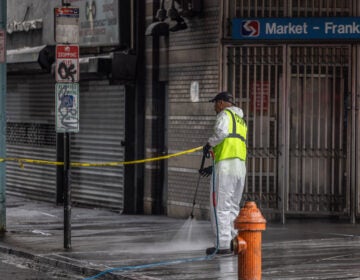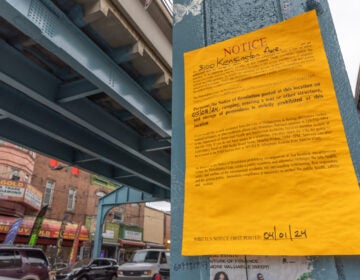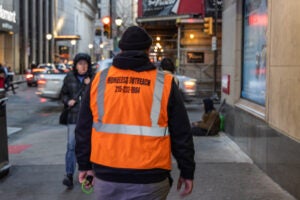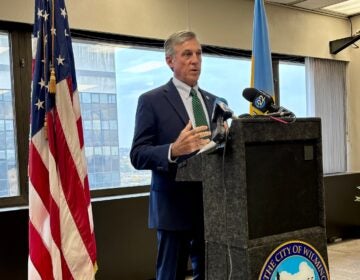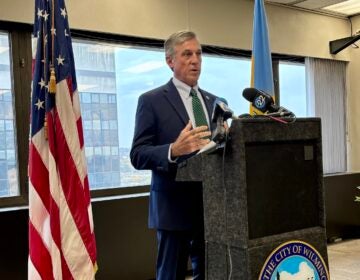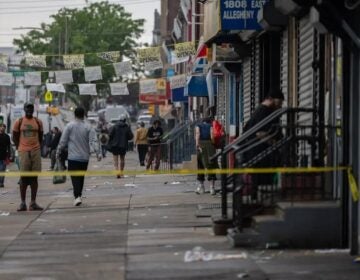After Kensington encampment shutdown, what’s next for Philly’s plan to address the addiction crisis?
City police and outreach workers continue to monitor the area of Kensington’s open-air drug market as harm reduction workers provide a bridge to support services.
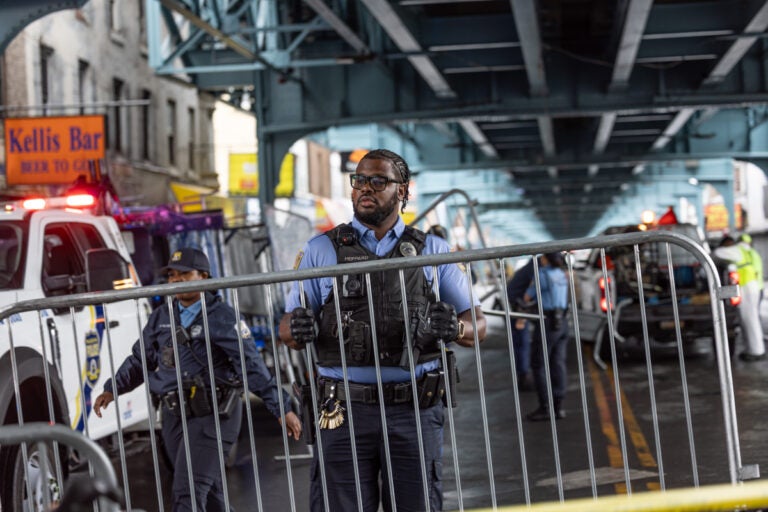
Philadelphia police install barricades along Kensington Avenue after removing people who were camped out there and cleaning the sidewalk. (Kimberly Paynter/WHYY)
From Philly and the Pa. suburbs to South Jersey and Delaware, what would you like WHYY News to cover? Let us know!
The tents have been removed, debris cleared out, but people who are homeless and dealing with substance use or mental illness are still living on the streets around Philadelphia’s Kensington neighborhood after a recent encampment sweep.
In the early morning hours of May 8, Philadelphia police began clearing tents, tarps and other sidewalk structures from the 3000 and 3100 blocks on Kensington Avenue, before city outreach workers arrived with support services, according to several witnesses.
Despite that, city officials said they’ve placed at least 135 people into housing programs, addiction treatment and medical care. But many others who regularly camped out near the intersection of Kensington and Allegheny avenues — “K&A” — have been displaced.
“We’re happy inevitably some got services, but disappointed in the execution,” said Liddy Rechenberg, director of communications at Savage Sisters Recovery, a nonprofit on harm reduction and recovery housing. “We feel concerned this action doesn’t fully address or acknowledge what is truly needed for the community.”
While police continue to patrol the area and city outreach workers stay on the scene, harm reduction workers and addiction treatment providers say they remain committed to helping people who are using drugs out on the street and living with substance use disorders as the city develops a long-term plan to address the opioid crisis.
In the days leading up to and following the encampment clearing, harm reduction workers from Prevention Point Philadelphia were out distributing boxes of Narcan, an opioid overdose reversal medication. Other workers and volunteers from various groups were out cleaning sidewalks of used syringes and other trash, and providing meals and other supplies to people on the street.
Savage Sisters’ drop-in center on the 3100 block of Kensington Avenue reopened Thursday after being closed during the single-day encampment clearing.
On Thursday night, Operation In My Backyard held its scheduled outreach event on Kensington Avenue to hand out food, water, sterile injection and smoking supplies, condoms, CPR face shields and sharps containers for people to store new or used needles.
Founder Nicole Bixler said they saw many familiar faces at their event, with one regular participant unaccounted for.
As they set up under the overpass bridge near Lehigh Street to avoid the rain, they were approached by police who were enforcing street permits. Bixler said officers told the organization that no groups were allowed to use the space under the bridge as a distribution location, or else risk a citation going forward.
Bixler said they won’t be using that spot again, but will continue to offer services at a regular spot near Kensington Avenue.
The business corridor of Kensington and the heart of the area’s open-air drug market has seen a number of encampment resolutions and clearings in the past, with minimal lasting impact.
City Councilmember Quetcy Lozada, who represents the neighborhood in District 7, said she hopes the most recent resolution is just the beginning for long-term change in the community, both for residents and those who are homeless and/or living with addiction.
“It is important that we all take note of where these individuals are moving and encampments are being set up so that outreach can continue and more people can be brought into treatment,” Lozada said in a statement. “Just because the most visible area of the open-air drug market was cleared does not mean the crisis is over. Work will continue to be done. I expect more encampment resolutions, more outreach, and more investment.”
Mayor Cherelle Parker’s strategy to permanently shut down Kensington’s open-air drug market and address the opioid crisis citywide includes establishing “triage” centers for people who need help with housing, addiction treatment and other social services.
Earlier this month, the city issued a request for proposal for consultant services for these proposed centers. The proposal states that the city “has identified several locations for consideration and seeks a consultant to assist with needs to assess the fitness and requirements of those spaces for various levels of treatment.”
However, those plans are already facing some pushback in City Council. After a Philadelphia Inquirer report showed that a possible triage location could be in the Fairmount section of the city, Councilmember Jeffery Young Jr. criticized the city for a lack of transparency and notification about a proposed site in his district.
“I do not support a triage center at this location without undergoing a thorough review and discussion with the community to address potential implications,” Young said Thursday during a council meeting. “It is unacceptable to undertake such a significant project without consulting the communities and stakeholders who will be most affected.”
WHYY is your source for fact-based, in-depth journalism and information. As a nonprofit organization, we rely on financial support from readers like you. Please give today.


